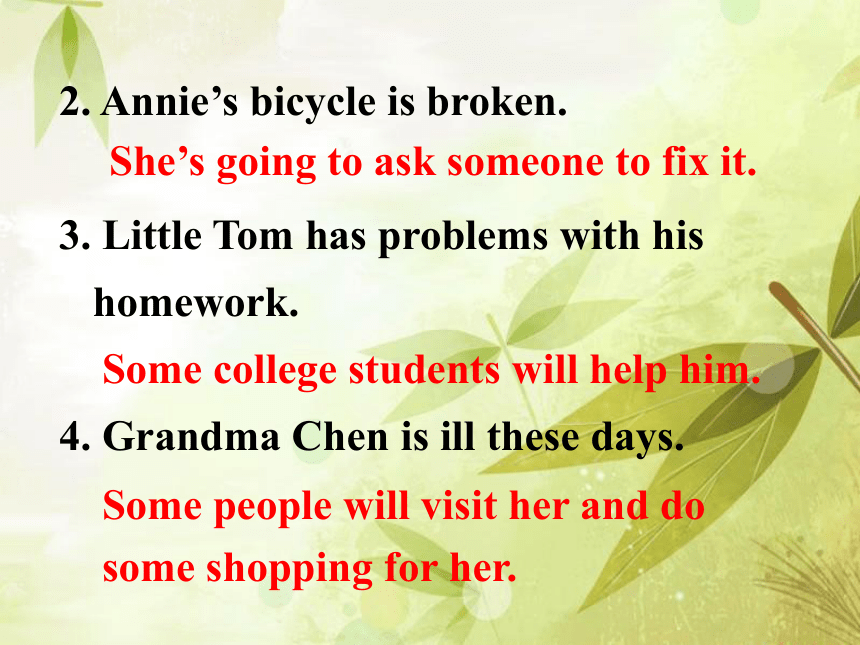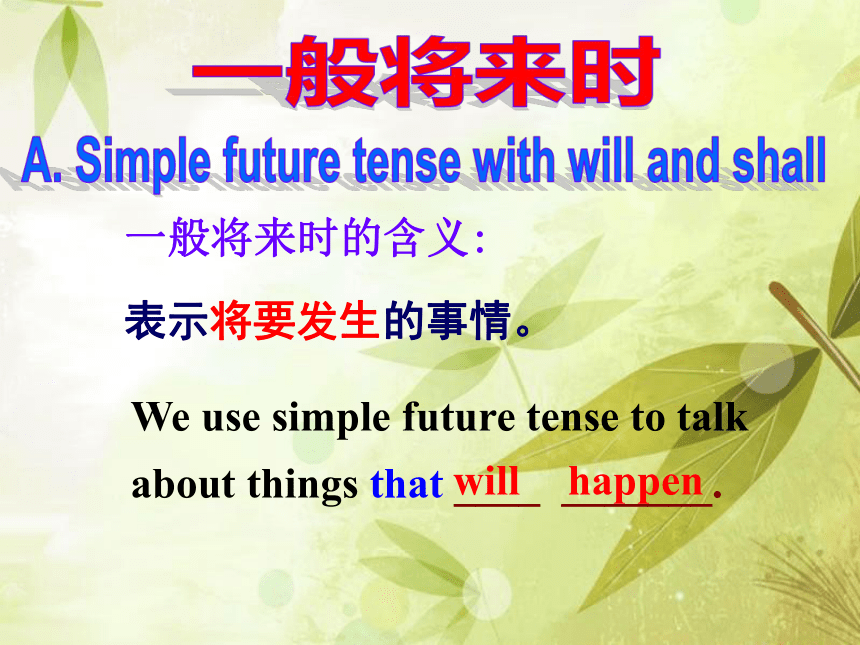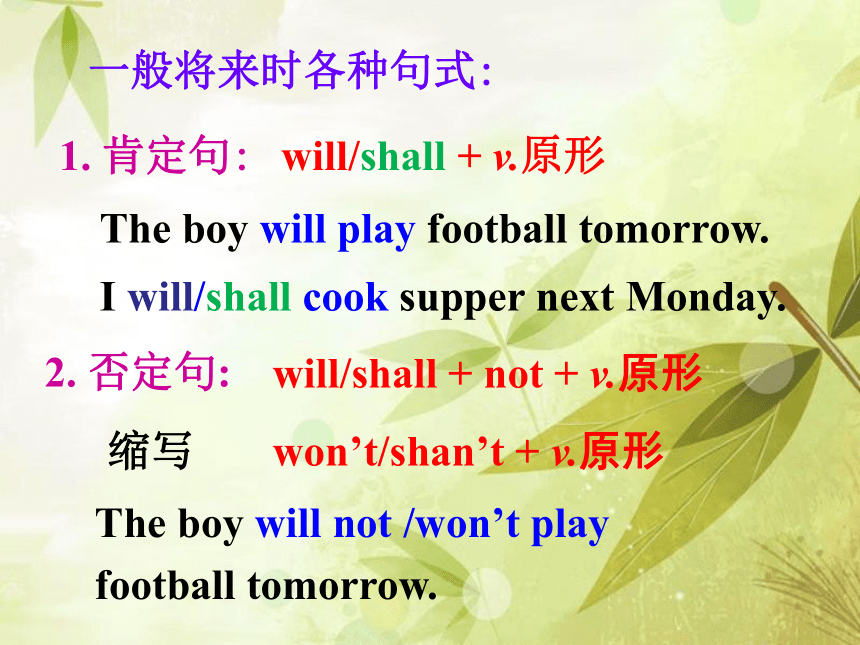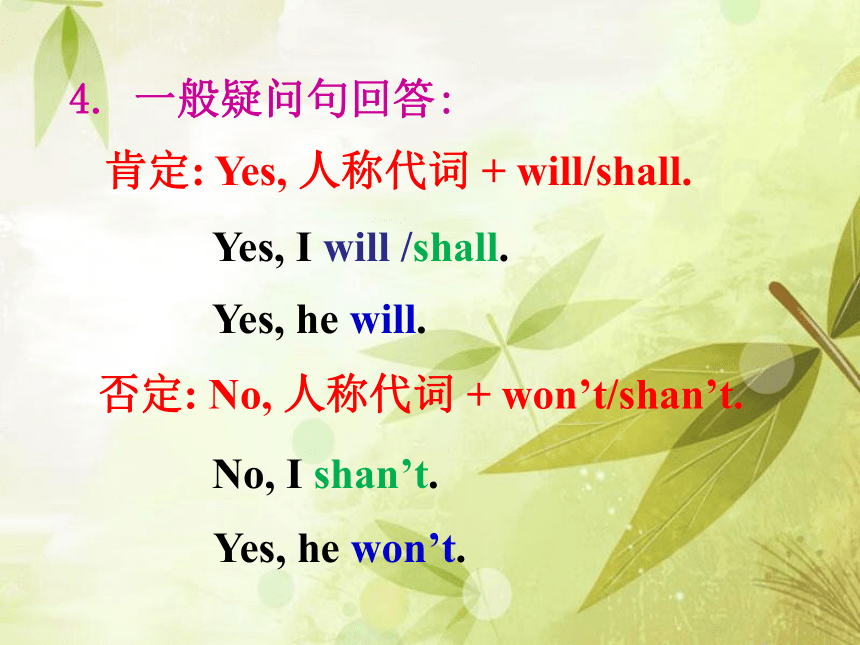七下Unit2 NeighboursGrammar课件
文档属性
| 名称 | 七下Unit2 NeighboursGrammar课件 |  | |
| 格式 | zip | ||
| 文件大小 | 2.5MB | ||
| 资源类型 | 教案 | ||
| 版本资源 | 牛津译林版 | ||
| 科目 | 英语 | ||
| 更新时间 | 2016-03-12 14:14:49 | ||
图片预览









文档简介
课件26张PPT。GrammarUnit 2 Neighbours1.Simon’s computer doesn’t work well. How can he get help from the communit y centre?How can they get help from the community centre?He’s going to ask a computer engineer to check his computer.Revision2. Annie’s bicycle is broken.
3. Little Tom has problems with his homework.
4. Grandma Chen is ill these days.She’s going to ask someone to fix it.Some college students will help him.Some people will visit her and do some shopping for her.We use simple future tense to talk about things that ____ _______.willhappen一般将来时的含义:表示将要发生的事情。一般将来时A. Simple future tense with will and shall 一般将来时各种句式:1. 肯定句:will/shall + v.原形The boy will play football tomorrow.I will/shall cook supper next Monday.2. 否定句:will/shall + not + v.原形won’t/shan’t + v.原形The boy will not /won’t play football tomorrow.缩写I shall not /shan’t cook supper next Monday.3. 一般疑问句:将will/shall置于句首。Will the boy play football tomorrow?Shall I cook supper next Monday?4. 一般疑问句回答:肯定: Yes, 人称代词 + will/shall.否定: No, 人称代词 + won’t/shan’t.Yes, I will /shall.Yes, he will.No, I shan’t.Yes, he won’t.5. 特殊疑问句:What will/shall we play?我们将玩什么?你们明天将在哪里玩?Where will you play tomorrow? 他将什么时候打篮球?When will he play basketball? I. 用正确的时态填空。
1. The twin brothers _______ (go) fishing next Tuesday.
2. We _____________ (meet) outside the school gate tomorrow.
3. — How ____ they ____ (visit) the History Museum next week?
— By bus.will gowill/shall meetwill visitLet's practise. Amy will do her homework tonight.
(否定句)
(一般疑问句)
(肯定、否定回答)
(对划线部分提问) Amy won’t do her homework tonight.Will Amy do her homework tonight?Yes, she will.No, she won’t.What will Amy do tonight?II. 句型转换:Simon’s computer is broken. He is asking someone at the community centre for help. Complete their conversation with the simple future tense of the verbs in brackets.Asking for helpMr Lin: Hello, Simon. Do you need any help?
Simon: Yes, Mr Lin. There’s something wrong with my computer.
Mr Lin: OK. We ____________ (ask) an engineer to check it for you.
Simon: When ____ the engineer ___ (be) free?shall/will askwillbeMr Lin: Well, we _______ (call) him first. _____ you _____ (wait) for us to call back?
Simon: All right. I _____________ (wait) for your call, Thanks.
Mr Lin: You’re welcome.will callWillwaitwill/shall waitWe use ‘be going to’ to talk about fixed plans for a certain time in the near future.be going to 结构的含义:1. 表示计划、打算或在不远的将来要做某事。B. Simple future tense with be going toWe use ‘be going to’ to talk about things that will probably happen. 2. 表示将可能发生的事。be going to各种句式:1. 肯定句:be going to + v.原形2. 否定句:be + not + going to + v.原形The boy is going to play football tomorrow.The boy is not /isn’t going to play football tomorrow.3. 一般疑问句:将be置于句首。Is the boy going to play football tomorrow?4. 一般疑问句回答:肯定: Yes, 人称代词 + be.
Yes, he is.否定: No, 人称代词 + be + not.
No, he isn’t.5. 特殊疑问句:疑问词 + be + 主语 + going to + v.原形Where are you going?你打算去哪里?你打算什么时候去踢足球?When are you going to play football?你打算去哪里踢足球?Where are you going to play football?将来时的典型标志:next Tuesday / week / month …Tomorrow (morning/afternoon …)this afternoon … /Sunday …tonightthe coming Sunday … the day after tomorrowsoonin the future今夜不久(在)将来后天in + 一段时间……后即将到来的星期天…Simon is telling Amy about his plan for a day out with his uncle’s family. Help him use the correct forms of be going to to talk about his plan.Planning a day outSimon: Hi, Amy. My parents and I are planning a day out with my uncle’s family the day after tomorrow.
Amy: Great! What ____ you ___________ (do)?
Simon: I ______________ (buy) some food, and my cousin Annie _______________ some plates and forks.
Amy: What ____ your parents __________ (do)?aregoing to doam going to buyis going to buygoing to doareSimon: They _________________ (bring) some water.
Amy: How about your uncle?
Simon: He ______________ (make) a fire.
Amy: And your aunt? What ____ she ________ do?
Simon: She ______________ (cook) some food.are going to bringis going to makeisgoing tois going to cookWe _______________ (meet) outside the school gate tomorrow.
2. How ____ they ___________ (visit) the History Museum next week?
Exercisesshall/will meetare going to meetwillvisitaregoing to visit3. We are going to have an exam next week.(改为否定句并提问)
4. Tom will see a film this evening.
(提问)
We aren’t going to have an exam next week. What are we going to have next week?What will Tom see this evening?Pay attention to these! 有些动词,如:come, go, leave 等,其现在进行时可表示将来时。eg. (1) We are leaving on Sunday.(2) Lisa is coming back from New York tomorrow.(3) Is your father going to the USA soon?1. 明天Tom将去公园。
2. 今天晚上我去购物。
3.明天有雨。
4. 他们打算买一辆小汽车。
5. 这个星期天你去游泳吗?
Homework翻译下面句子并根据要求转换句型。
3. Little Tom has problems with his homework.
4. Grandma Chen is ill these days.She’s going to ask someone to fix it.Some college students will help him.Some people will visit her and do some shopping for her.We use simple future tense to talk about things that ____ _______.willhappen一般将来时的含义:表示将要发生的事情。一般将来时A. Simple future tense with will and shall 一般将来时各种句式:1. 肯定句:will/shall + v.原形The boy will play football tomorrow.I will/shall cook supper next Monday.2. 否定句:will/shall + not + v.原形won’t/shan’t + v.原形The boy will not /won’t play football tomorrow.缩写I shall not /shan’t cook supper next Monday.3. 一般疑问句:将will/shall置于句首。Will the boy play football tomorrow?Shall I cook supper next Monday?4. 一般疑问句回答:肯定: Yes, 人称代词 + will/shall.否定: No, 人称代词 + won’t/shan’t.Yes, I will /shall.Yes, he will.No, I shan’t.Yes, he won’t.5. 特殊疑问句:What will/shall we play?我们将玩什么?你们明天将在哪里玩?Where will you play tomorrow? 他将什么时候打篮球?When will he play basketball? I. 用正确的时态填空。
1. The twin brothers _______ (go) fishing next Tuesday.
2. We _____________ (meet) outside the school gate tomorrow.
3. — How ____ they ____ (visit) the History Museum next week?
— By bus.will gowill/shall meetwill visitLet's practise. Amy will do her homework tonight.
(否定句)
(一般疑问句)
(肯定、否定回答)
(对划线部分提问) Amy won’t do her homework tonight.Will Amy do her homework tonight?Yes, she will.No, she won’t.What will Amy do tonight?II. 句型转换:Simon’s computer is broken. He is asking someone at the community centre for help. Complete their conversation with the simple future tense of the verbs in brackets.Asking for helpMr Lin: Hello, Simon. Do you need any help?
Simon: Yes, Mr Lin. There’s something wrong with my computer.
Mr Lin: OK. We ____________ (ask) an engineer to check it for you.
Simon: When ____ the engineer ___ (be) free?shall/will askwillbeMr Lin: Well, we _______ (call) him first. _____ you _____ (wait) for us to call back?
Simon: All right. I _____________ (wait) for your call, Thanks.
Mr Lin: You’re welcome.will callWillwaitwill/shall waitWe use ‘be going to’ to talk about fixed plans for a certain time in the near future.be going to 结构的含义:1. 表示计划、打算或在不远的将来要做某事。B. Simple future tense with be going toWe use ‘be going to’ to talk about things that will probably happen. 2. 表示将可能发生的事。be going to各种句式:1. 肯定句:be going to + v.原形2. 否定句:be + not + going to + v.原形The boy is going to play football tomorrow.The boy is not /isn’t going to play football tomorrow.3. 一般疑问句:将be置于句首。Is the boy going to play football tomorrow?4. 一般疑问句回答:肯定: Yes, 人称代词 + be.
Yes, he is.否定: No, 人称代词 + be + not.
No, he isn’t.5. 特殊疑问句:疑问词 + be + 主语 + going to + v.原形Where are you going?你打算去哪里?你打算什么时候去踢足球?When are you going to play football?你打算去哪里踢足球?Where are you going to play football?将来时的典型标志:next Tuesday / week / month …Tomorrow (morning/afternoon …)this afternoon … /Sunday …tonightthe coming Sunday … the day after tomorrowsoonin the future今夜不久(在)将来后天in + 一段时间……后即将到来的星期天…Simon is telling Amy about his plan for a day out with his uncle’s family. Help him use the correct forms of be going to to talk about his plan.Planning a day outSimon: Hi, Amy. My parents and I are planning a day out with my uncle’s family the day after tomorrow.
Amy: Great! What ____ you ___________ (do)?
Simon: I ______________ (buy) some food, and my cousin Annie _______________ some plates and forks.
Amy: What ____ your parents __________ (do)?aregoing to doam going to buyis going to buygoing to doareSimon: They _________________ (bring) some water.
Amy: How about your uncle?
Simon: He ______________ (make) a fire.
Amy: And your aunt? What ____ she ________ do?
Simon: She ______________ (cook) some food.are going to bringis going to makeisgoing tois going to cookWe _______________ (meet) outside the school gate tomorrow.
2. How ____ they ___________ (visit) the History Museum next week?
Exercisesshall/will meetare going to meetwillvisitaregoing to visit3. We are going to have an exam next week.(改为否定句并提问)
4. Tom will see a film this evening.
(提问)
We aren’t going to have an exam next week. What are we going to have next week?What will Tom see this evening?Pay attention to these! 有些动词,如:come, go, leave 等,其现在进行时可表示将来时。eg. (1) We are leaving on Sunday.(2) Lisa is coming back from New York tomorrow.(3) Is your father going to the USA soon?1. 明天Tom将去公园。
2. 今天晚上我去购物。
3.明天有雨。
4. 他们打算买一辆小汽车。
5. 这个星期天你去游泳吗?
Homework翻译下面句子并根据要求转换句型。
